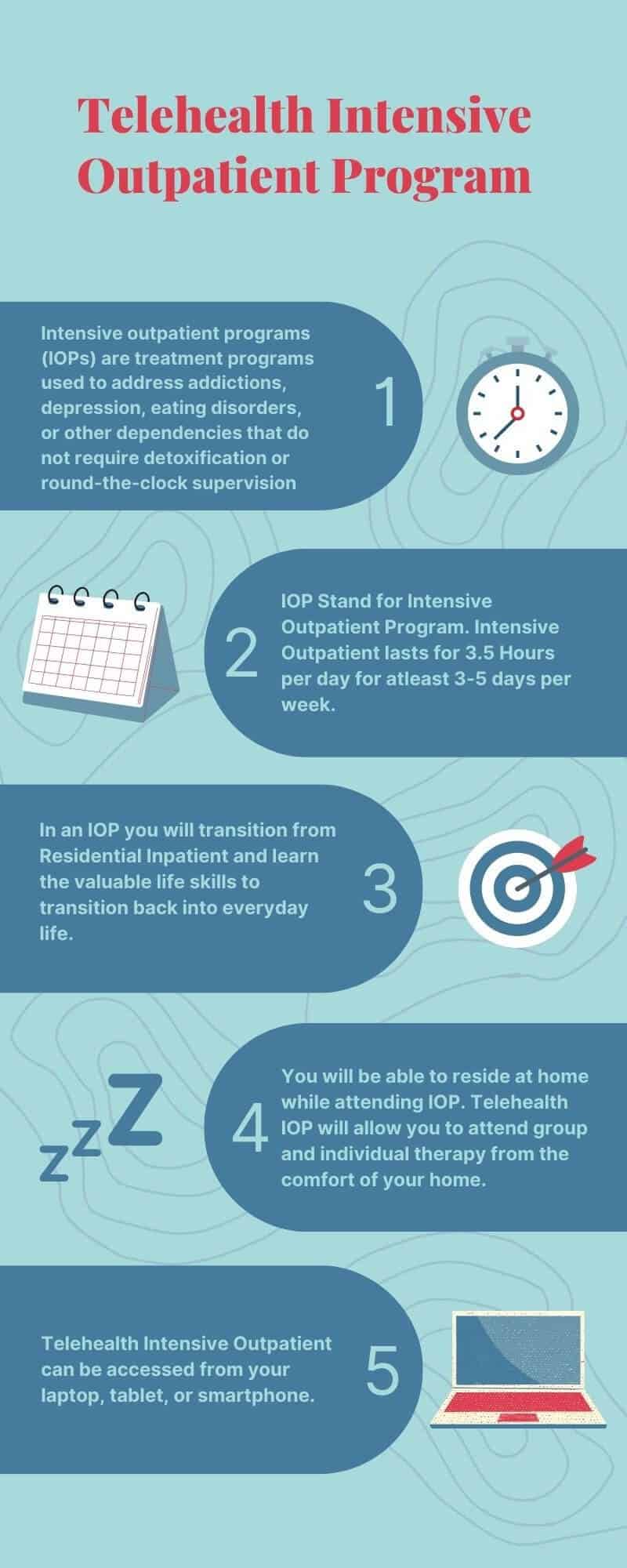Discover the Conveniences of an Intensive Outpatient Program (IOP) for Healing
Wiki Article
The Influence of Holistic Therapies on Mind-Body Recovery in an Intensive Outpatient Program
In the world of extensive outpatient programs, the unification of holistic therapies has stimulated substantial passion and debate among specialists in the area of mental health and health. The expedition of different techniques, such as yoga exercise, meditation, acupuncture, and mindfulness techniques, elevates inquiries regarding their effectiveness in promoting mind-body healing for individuals undergoing treatment. As the need for thorough and integrative care grows, comprehending the effect of these alternative interventions within the organized structure of an extensive outpatient program comes to be significantly critical. The potential synergy between conventional healing techniques and alternative techniques in promoting all natural well-being stays a subject ripe for exploration and analysis.Integrating Holistic Therapies in IOP
Including holistic therapies right into Extensive Outpatient Programs (IOP) can boost the overall health and treatment outcomes of individuals looking for psychological wellness assistance. Holistic therapies concentrate on dealing with the entire person, attending to not just the symptoms but likewise the underlying root causes of psychological health issues. By integrating methods such as yoga, meditation, art therapy, and acupuncture right into IOP setups, patients can experience a more comprehensive approach to their treatment.
Advantages of Yoga and Reflection
By infusing IOP setups with alternative therapies like yoga exercise and meditation, people can access a variety of benefits that add to their mental and emotional health - Intensive Outpatient Program (IOP). Furthermore, yoga exercise improves self-awareness and fosters a feeling of inner tranquility, which can be particularly valuable for individuals undertaking extensive outpatient treatment.By incorporating meditation right into their routine, individuals in an IOP can discover to manage racing thoughts, enhance concentration, and grow an extra favorable expectation on life. Incorporating yoga and meditation into IOP settings can substantially improve the psychological and psychological health of people looking for all natural recovery.
Acupuncture for Mind-Body Recovery
Acupuncture, a conventional Chinese medication method involving the insertion of thin needles into particular points on the body, provides an one-of-a-kind method to mind-body recovery by targeting energy flow and promoting holistic wellness. This ancient strategy is best site based upon the concept of Qi, the body's vital force, flowing along meridians or pathways. By stimulating specific acupoints, acupuncturists intend to recover the equilibrium of Qi, which is believed to be necessary for general health and wellness and wellness.
In addition, acupuncture is significantly being incorporated into Western medicine practices to complement conventional therapies for numerous psychological health problems, supplying an alternative approach that takes into consideration the interconnectedness of the body and mind in promoting recovery and wellness.
Mindfulness Techniques in Treatment
Increasing on the world of alternative therapies, mindfulness strategies play an essential duty in therapy by promoting a much deeper link in between the mind and body for overall health. Mindfulness, rooted in old contemplative techniques, includes taking note of today minute non-judgmentally - Intensive Outpatient Program (IOP). In the context of an intensive outpatient program, including mindfulness methods can help people establish self-awareness, regulate feelings, and decrease stress degrees. Through mindfulness reflection, individuals can grow a heightened feeling of awareness of their ideas, sensations, and physical experiences, advertising a better understanding of the interconnectedness in between physical and mental wellness.
By urging people to observe their ideas without attachment or judgment, mindfulness fosters a sense of approval and concern towards oneself. Inevitably, incorporating mindfulness techniques right into therapy plans can encourage individuals to actively participate in their recovery journey and advertise alternative well-being.
Evaluating Alternative Interventions' Efficiency

Qualitative assessments, on the other hand, involve collecting subjective responses from individuals regarding their experiences with holistic treatments. This qualitative data can offer Visit This Link beneficial insights right into the regarded advantages of these therapies on individuals' overall well-being, high quality of life, and coping systems. By incorporating quantitative information with qualitative feedback, scientists can obtain a much more alternative understanding of the effectiveness of these interventions in advertising mind-body recovery within an intensive outpatient program. Such examinations are vital for educating evidence-based techniques and maximizing all natural therapy methods for people looking for extensive health.
Conclusion
To conclude, the integration of all natural therapies such as yoga, meditation, acupuncture, and mindfulness strategies in an intensive outpatient program can have a substantial effect on mind-body recovery. These therapies offer a more extensive approach to treatment by dealing with the physical, psychological, and spiritual facets of an individual's wellness. Evaluating the efficacy of these alternative interventions is important in understanding their potential advantages in improving the total recovery process for people in an outpatient setting.Report this wiki page